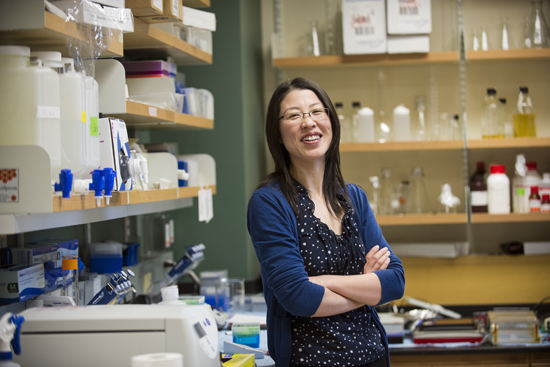ENG’s Xue Han Named Pew Scholar
Brain researcher builds tools with pulses of light

ENG assistant professor, Xue Han was named a Pew Scholar in the Biomedical Sciences by the Pew Charitable Trusts for her research into developing tools to study cognitive functions. Photo by Cydney Scott
A notoriously shrinking nationwide research funding market is making it increasingly difficult to secure grants for innovative research. But for the third time in two years, the efforts of a College of Engineering assistant professor of biomedical engineering to make better tools to study the brain have been rewarded.
In March 2011, Xue Han won a 2011 Sloan Research Fellowship, which provides $50,000 in research support over two years. Last August, she was chosen for one of three Peter Paul Fellowships, which give promising BU junior faculty members $40,000 annually for three years to pursue their research.
And today, Han, who uses pulses of light to control brain cells and discern their influence on attention, memory, and decision-making, was named a Pew Scholar in the Biomedical Sciences by the Pew Charitable Trusts. The award brings $240,000 over four years and will help Han expand her work.
Kenneth Lutchen, dean of ENG and a professor of biomedical engineering, says it is gratifying to see Han recognized with such an important award. “Her research is impressive,” says Lutchen. “It represents important advances in understanding and correcting brain disorders through a very creative synthesis of emergent biological and engineering technologies. She is one of several of the College of Engineering’s newest faculty whose early career success has been recognized nationally in recent years, a development that bodes well for the college’s future.”
Han’s research uses light to activate or silence individual brain cells for a matter of milliseconds, enabling her and her team to identify connections between those cells and specific behaviors. The researchers hope to learn, for example, which cells in the prefrontal cortex trigger successful actions and which spark dysfunctional behavior. Understanding disorders at the neural circuits level could yield new drugs and other therapeutic approaches to a wide spectrum of ailments, including attention deficit disorders, depression, Parkinson’s disease, and schizophrenia. At this stage, however, Han’s goal is developing tools to study cognitive functions.
The latest award will help her “develop better technology to interpret the brain with more precision,” she says. “The brain is very complicated. There are many angles to studying it. At this point, our research is basic, and treatments that might use it are far away.”
Solomon R. Eisenberg, an ENG professor and chair of the biomedical engineering department, says Han’s work “represents an exciting new frontier” that “helps add to the cache of neuroscience and neuroengineering within the biomedical engineering department and among the interdisciplinary neuro-based initiatives at BU.”
In fact, both the early stage and the potential payoff of Han’s research worked in her favor during Pew’s selection process. “We encourage high-risk, high-reward projects,” says Anita Pepper, manager of the Pew Scholars program. “To us, it’s not about seeing results tomorrow. It’s about what she’s done for the field and where that might lead 15 years down the line.”
Han’s postdoctoral advisor Robert Desimone, director of the McGovern Institute for Brain Research at the Massachusetts Institute of Technology, predicts that her work “will result in new treatments, certainly in our lifetime, and likely in the next 10 years.”
The Pew prize recognizes promising young scientists who have served no more than three years at the assistant professor level and are involved in cutting-edge research. Han is one of 22 recipients of the award this year, selected from 134 nominations. Winners had to go through three rounds of reviews conducted by 16 top scientists, among them two Nobel laureates.
Han is BU’s second Pew Biomedical Scholar, joining Mark Grinstaff, an ENG professor of biomedical engineering and a College of Arts & Sciences professor of chemistry, who was honored in 1999.
Born in China, Han earned a BS in biophysics from Beijing University and a PhD in physiology from the University of Wisconsin–Madison. She’s been a member of ENG’s biomedical engineering faculty since July 2010.
Comments & Discussion
Boston University moderates comments to facilitate an informed, substantive, civil conversation. Abusive, profane, self-promotional, misleading, incoherent or off-topic comments will be rejected. Moderators are staffed during regular business hours (EST) and can only accept comments written in English. Statistics or facts must include a citation or a link to the citation.